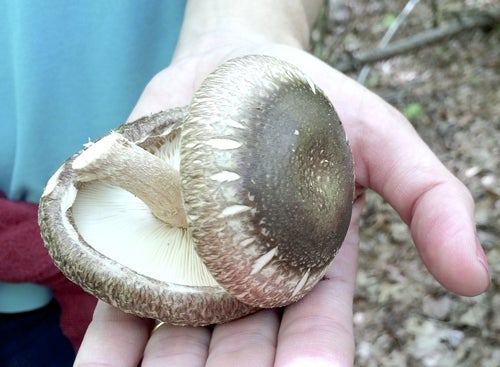Danelle Cutting: Growing mushrooms is no easy task
Published 12:06 am Friday, May 8, 2015

- Cooperative Extension Mature shiitake mushrooms are very popular, but it's hard to know when they'll be ready.
By Danelle Cutting
Rowan Cooperative Extension
By working with local farmers, I get exposed to many new ideas, growing techniques and unique crops that have not been previously grown in our area.
One such crop is mushrooms, mainly being the shiitake mushroom. We have had a few classes on growing shiitake, and it is definitely not for the faint of heart. For the home gardener, it is nice to have a few mushrooms here and there but for those who have hundreds or thousands of logs, not having a consistent supply can be a problem.
N.C. A&T State University helps host mushroom growing workshops in early spring and offers free mushroom spawn to growers who are willing to commit to at least 200 logs. The mushrooms are best grown in white or red oak logs, cut within two weeks of use, no longer than 4 feet in length, and no more than 8 inches in diameter.
Growers drill holes into the logs and pack them with “sawdust spawn.” Then, they seal the holes, cuts and cut ends with cheese or beeswax. The reason they use fresh logs and wax is to prevent other fungi from inoculating the logs so that the grower can be sure of the mushrooms that will be sprouting.
The logs are usually staked under pine trees or shade. Newly inoculated logs can take six months to a year before they start fruiting. Logs can last up to 10 years, but the type of wood used contributes to getting the most life out of them.
Fruiting logs are sporadic and depending on the type of spawn, they fruit in the spring or fall, usually after a rain. Some growers try to force the logs to fruit by soaking them in a water bath. Forcing the inoculated logs can help, but it is not 100 percent effective, which makes predicting when a grower will have fresh mushrooms almost impossible.
For many of the first growers, it was feast or famine; they would have 50 pounds of mushrooms one week and then none the next. Most growers are also dehydrating the precious mushrooms so that they do not lose a crop.
Producing shiitake sounds easy until you try and market a product that you cannot guarantee when or how much you will have. So, be sure to appreciate the growers who bring them to market.
Shiitake mushrooms are great and delicious. I love mine sautéed in olive oil, salt and fresh garlic, simple but amazing.
If you would like more information on buying local, growing your own shiitake mushrooms, or on the topics mentioned in this article, please call your local Cooperative Extension agent, Danelle Cutting, at 704-216-8970.





